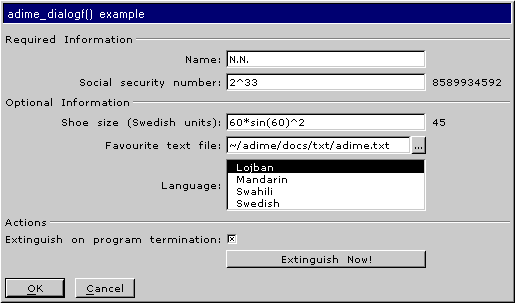Adime
Allegro Dialogs Made Easy
Table of contents:Introduction
Licence
Download
Detailed Features
Screenshot
Documentation
It currently works with Linux, MinGW32, Borland C++, MSVC, DJGPP, Watcom, QNX and Mac OS X. Help with porting (e.g., to Unix, or BeOS) would be very appreciated!
The sourceforge project page is at http://sf.net/projects/adime/
| adime221.zip | Source of Adime 2.2.1 (in a zip archive with dos/windows style text files) | 322 kB |
| adime-2.2.1.tar.gz | Source of Adime 2.2.1 (in a tar.gz archive with unix style text files) | 245 kB |
This is a source only distribution, so you will have to build it after unzipping the archive. The following instructions for each platform can also be found in the directory adime/docs/build/ in the archives: linux.txt, mingw32.txt, bcc32.txt, msvc.txt, djgpp.txt, watcom.txt, qnx.txt, macosx.txt. It requires Allegro version 4.0.0 or later (the Mac OS X port requires the latest Allegro WIP release).
If you use MSVC or QNX, note that it has not been tested yet (because I don't have access to the platform). Any reports would be appreciated. If there are problems under MSVC, please try the release notes for previous version (2.2.0) and let me know if it works.
file_select(),
d_edit_proc(),
d_list_proc(),
d_button_proc(),
d_check_proc() and
d_text_list_proc().
Gui functions for edit boxes with mathematical
expressions and a multi-line version of
d_text_proc().

This dialog was generated with the single function call:
adime_dialogf(
"adime_dialogf() example",
ADIME_ALIGN_CENTRE, ADIME_ALIGN_CENTRE, 200,
"Required Information%line[]"
"Name:%string[256]"
"Social security number:%double[0,9999999999]"
"Optional Information%line[]"
"Shoe size (Swedish units):%float[10,70]"
"Favourite text file:%filename[256,txt,Select a text file]"
"Language:%list[,Lojban;Mandarin;Swahili;Swedish]"
"Actions:%line[]"
"Extinguish on program termination:%bool[]"
"%button[Extinguish Now!]",
name, &age, &shoe_size, &file_name, &language_index, &extinguish_flag, extinguish_callback);
| By Sven Sandberg, svens@it.uu.se. Last updated on 6 August 2005. |